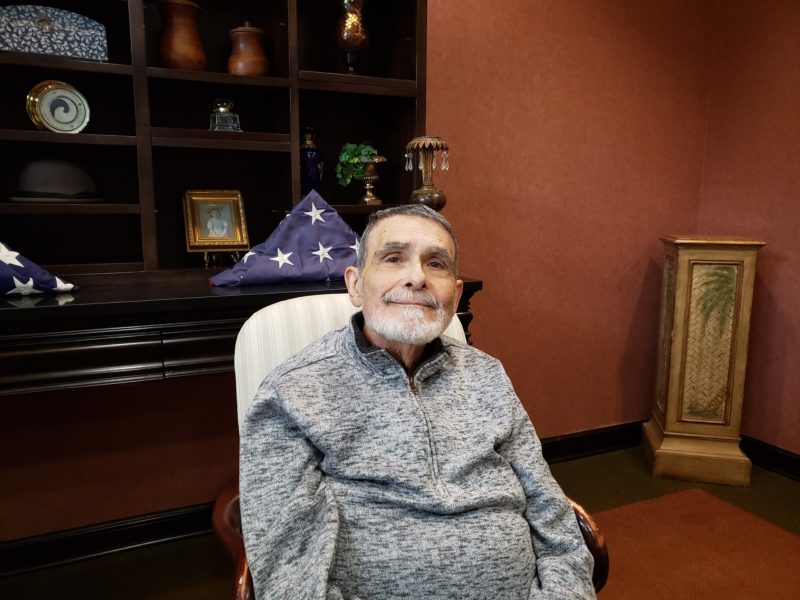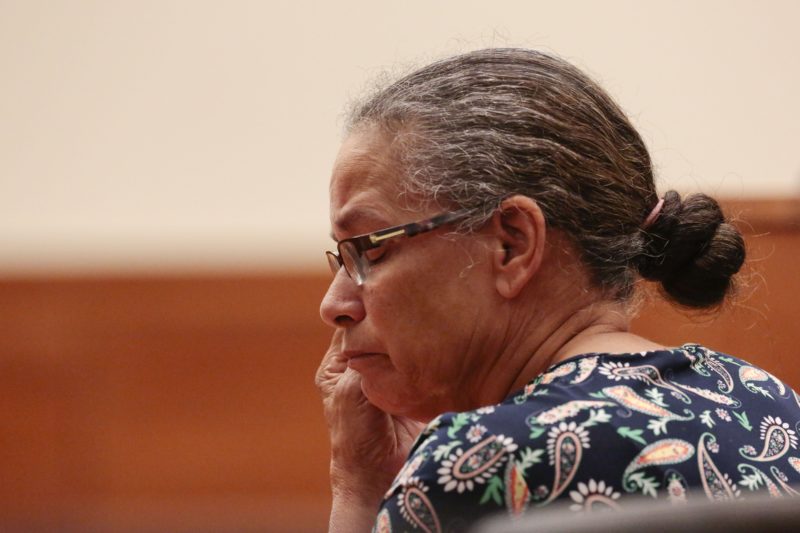Foreclosed and Fleeced
Vulnerable homeowners lose thousands in scheme involving lost properties
Two years after her husband passed away, Juanita Mang lost the Westerville home where she had lived for 40 years.
The house went into foreclosure and was sold at a sheriff's auction in September 2017. After the mortgage and other debts were paid, $54,508 remained.
The money belonged to Mang, who was unable to pay her mortgage because of medical bills left from her husband's illness. But she didn’t know it.
Robert P. Anderson did. The Powell real estate agent made it his business to know these things.
Sometimes with the help of a private investigator, Anderson tracked down people such as Mang who were going through foreclosure, and offered them a deal. Anderson told the often-desperate homeowners that he could relieve them of their financial burdens, perhaps even save their home or help them remain in it, according to court records and interviews. All they had to do was sign a document giving him rights to the property.
In exchange, he gave them $1,000 to $3,000.
Anderson didn't tell the homeowners that they had far more money in surplus funds waiting for them at the Franklin County Clerk of Court's Office, and that signing away their rights to the property allowed him to collect every penny of the surplus — amounts ranging from $14,000 to more than $60,000.
“I was flabbergasted,” said Mang, 71, after learning that Anderson collected $54,508 that could have been hers had she not signed away her rights for $2,000 in exchange for his promise to try to get her house back.
“I've never heard of anything so crooked."
She wasn't alone.
A review of court records shows that Anderson, 59, collected $644,388 in surplus funds after acquiring property rights from 17 foreclosures in Franklin County over the past three years under the name Florida Financial LLC. Of the nine former homeowners who either spoke with The Dispatch or told their stories in court documents, none knew that funds awaited them or that they were signing away their rights to the money.
In addition, Anderson collected at least $359,360 in surplus foreclosure funds in recent years through other companies, including RPA Development, Greentree Financial Ltd and 150 E. 13th Ave.
Judge Stephen L. McIntosh, the Franklin County Common Pleas Court's administrative judge, said he doesn't know whether Anderson's actions rise to the level of criminal fraud, but "it's clearly unethical."
Anderson said he could not remember whether he told homeowners they had money coming to them. "I ask people if they want to sell their interest," he said in a brief interview outside his Powell office.
"I don't cheat people," he said. "I can't help it if somebody's upset they didn't get the best deal. ... I didn't put a gun to their head."
At a December court hearing about one of the requests, Anderson's attorney, Kerry Donahue of Dublin, estimated that 95% of homeowners don't know they might have money left after a foreclosure.
Pressed by The Dispatch, Anderson acknowledged that he might not have told all of the homeowners about the funds.
"Well, you know what? I'm sorry. I didn't say there was a pile of rainbow money," he said.
Had they known about the money, former homeowners say they never would have signed away their rights.
"I was scammed," said Twyla Cherry, 68, who accepted $3,000 from Anderson in February 2018 after he told her he'd try to prevent her Dublin condominium from going to sheriff's auction. But the auction already had taken place, leaving a $49,061 surplus that Cherry was unknowingly signing over to him.
While Anderson profited, the former homeowners struggled.
Jennifer Dean moved in with her parents in Obetz after she lost her South Side ranch home to foreclosure. The 36-year-old is on disability because she has trouble breathing, but she hopes to return to the workforce, something that would have been easier with the $14,529 that Anderson collected from her property.
"I'd have my own place to stay, and hopefully a car," said Dean, who said that Anderson paid her $1,000 for her property rights. "It's hard to get around without a car."
Anderson's most recent payday was in May, when he collected the $26,662 balance from the sheriff's sale of Charles Castel's Upper Arlington ranch home.
After the court rejected Florida Financial's initial motion for the money, Anderson tracked down Castel in Arlington Court nursing home. Anderson's attorney, Donahue, persuaded Castel to sign an affidavit saying he was satisfied with forfeiting the money and couldn't come to court for a hearing because he is in a nursing home.

Judge Chris Brown expressed doubts about Florida Financial's request for the funds, but eventually granted the request after Castel failed to appear for two hearings.
Castel, 76, struggles to remember. After reviewing copies of the agreement and the affidavit for The Dispatch, he said the signatures were his. But he couldn't recall signing the documents or even meeting Anderson or Donahue. And he couldn't recall whether he was paid anything for his signature.
"It doesn't make any sense," Castel said when asked if he would have voluntarily given up his right to the money.
A family member who asked not to be named said Castel is "very confused" and has memory problems.
"It's heartbreaking that someone would go into a nursing home and take advantage of someone in that condition," the relative said.
Asked whether Castel was of sound mind and understood what he was signing, Anderson replied, "Everybody I've dealt with has been happy with what they got."
Judge Brown said it was "disturbing and troubling" to hear what The Dispatch learned from Castel. "I had questions about that affidavit from the minute it was filed," he said. "But (Castel) never showed up in court. It put me in a hard spot."
Money on the table
When a foreclosed home is sold by a county sheriff's office, the proceeds are distributed in a strict pecking order. The court clerk receives the first cut to cover expenses, followed by the county treasurer for any delinquent taxes, and the sheriff's office for conducting the sale. After that typically comes the main mortgage holder, followed by any homeowner's association and others who hold secured liens on the property.
Sometimes, when all those debts are paid, money is left over. That money belongs to the foreclosed homeowner.
"People don’t understand," said David Korn, a Columbus attorney who teaches real estate law at Columbus State Community College. "People think, 'The bank is taking it back, it’s all gone; I lose everything,' but of course equity is what you’ve earned. It's yours.
"This asset — probably the most valuable they’ve ever owned — is gone. ... I think that results in embarrassment and a weakened financial position and allows someone to come along and say, 'I'll help you out. Here’s five grand.'"
Even homeowners who think they are "underwater" — meaning they owe more on their mortgages than their homes are worth — might have money coming to them because mortgage companies, for a variety of reasons, sometimes choose not to pursue the debt.
Despite a state law requiring notification, the Franklin County Clerk of Court's office does not notify homeowners of their balance, contributing to unclaimed money piling up in the clerk's account. Almost 3,000 former Franklin County homeowners or their heirs have a total of $8 million waiting to be collected, in amounts ranging from 1 cent to $183,993.55.
In the vast majority of cases, the surplus is less than $1,000. But 184 former homeowners have more than $10,000 awaiting collection and nine have more than $100,000.
Donahue defended Anderson in the December court hearing by arguing that without Florida Financial, surplus foreclosure funds would simply sit in the clerk's office uncollected. Getting some money from companies such as Florida Financial is better than nothing, he said.
"Proceeds in a case like this would be paid to the clerk's office and they would sit there basically for infinity," said Donahue, who did not return Dispatch calls seeking comment.
Anderson told The Dispatch that "tons of" companies do the same thing he does, but most of those he cited are attorneys who collect money on behalf of former homeowners for a fee.

The Dispatch has found other companies that collect the entire foreclosure balance using a method similar to Anderson's. But according to court data, none in Franklin County collected as much as Anderson has over the past five years.
One of the most active in collecting the funds was East Side real estate investor Carl Woodford. Through a company called CSLKB1, Woodford has collected at least $259,781 in surplus funds from seven foreclosure cases in the past four years. In exchange for a few thousand dollars, Woodford persuaded homeowners to sign the deeds for their properties to him before they were sold at sheriff's sale, using those deeds to collect any surplus remaining after the sale.
Woodford, whose real estate license was revoked last year by the Ohio Department of Commerce for misconduct related to a 2014 sheriff's sale bid, said he is after the properties, not the surplus funds. Because he secures deeds to the properties before the sheriff's sale, he said, he doesn’t know how much money will be left after the sale.
Woodford, 57, also said he spends a lot of time and money securing and cleaning the homes after getting deeds.
"I'm willing to get dirty and put my hands in there, and I expect a reward," he said. "Profit is not a dirty word."
Although Woodford insists that he fully discloses the possibility of a surplus when he obtains the deeds, four people who deeded their homes to Woodford told The Dispatch or the courts that he never mentioned the money.

Ernestine M. Washington was owed $39,855, or half of the surplus from a 2017 sheriff's sale on the Bryden Road duplex that she and her ex-husband owned.
Woodford paid her $2,000 on the eve of the sheriff's sale in exchange for her half-interest in the property, by promising "to stop the sheriff's sale" and "ultimately rehab the property and negotiate a payoff of all debts," she said in an affidavit.
"Instead, Mr. Woodford was acquiring my interest solely for the purpose" of claiming the surplus proceeds, she wrote. The two sides eventually reached a court-approved settlement in which they divided what was to be her share of the surplus: $18,000 to Washington and $21,855 to CSLKB1.
Rosa Edwards signed her home near Nationwide Children's Hospital over to Woodford for $1,800 in November 2017 — one month before it went to sheriff's sale, allowing him to collect $44,032 after the sale.
"This is sort of hard to ... to just forgive someone for this," Edwards said.
Warning bells
Through his companies RPA Development and Greentree Financial Ltd, Anderson employed a process similar to Woodford's.
With Florida Financial, though, Anderson streamlined his tactics. He approached homeowners after their properties were sold at sheriff's sale, when the balance was clear and the risk minimized, as Anderson's attorney, Donahue, acknowledged in court.
Anderson’s method, however, required urgency. He had to gain rights to the property after the sheriff's sale but before the money was distributed. Those who dealt with him said Anderson was aggressively insistent in his efforts to get them to sign away their rights quickly.
After Anderson persuaded Jeanne Shaw to sign away rights to her Delaware home for $2,000 in May 2018, he showed up at the house with another man in the car who dialed up the pressure, Shaw said in a Delaware County court hearing.
“He kept going back and forth from his car to about halfway and saying we had to hurry up because they had to hurry up (to) get to the title office,” Shaw testified. “The guy sitting here kept saying, ‘Sign here, sign here,’ and flipping the pages for me to sign it."
One week later, Florida Financial used the paperwork to try to collect $36,742 due to Shaw.
But because she lives in Delaware County, Shaw received notice that she had a balance due her. Surprised to learn she had money, she contacted the court clerk, prompting a hearing before now-retired Delaware County Common Pleas Judge Everett Krueger.
Krueger awarded Shaw all the money after hearing from both sides, and suggested that Anderson misrepresented the transaction.
"I’m not saying there was any fraud or inducement," he said in court. "I’m not saying anything other than (Shaw) didn’t understand what she was doing. I think that’s pretty clear."
The case prompted Delaware County Magistrate Shari O’Neill at a September magistrates' conference to mention her concerns about Florida Financial to other magistrates, including those from Franklin County.
Franklin County Magistrate Elizabeth Watters followed up with an email warning staff attorneys and magistrates to be on the lookout for "the fraud being perpetrated by companies such as Florida Financial."
That warning led magistrates, judges and staff in Franklin County to more closely scrutinize foreclosure surplus distributions.
"Because of this, we're being more careful to make sure people aren't being taken advantage of," Judge McIntosh said.
Low profile
Despite his active real-estate life, Anderson keeps a very low profile. Those he's dealt with say he never produced any information about Florida Financial, and he never even left a card. No websites or Facebook pages exist for any of his firms — RPA Development, RPA Realty, Greentree Financial Ltd and Florida Financial. He is not identified in any of the Ohio incorporation papers of those companies.
Anderson's LinkedIn account identifies him as a broker at RPA Realty. He has kept his real estate license active by taking classes, most recently an ethics class in January.
In court documents, Florida Financial uses the address of a home in Naples, Florida, that Anderson and his wife, Tami, owned from 2001 to 2014, when they sold it for $1.375 million.
Those on the receiving end of his deals live far more modestly.
Mary Beth Hoffman, 36, and her two children have lived in the two-bedroom apartment of her sister, Jean Fondanova, since Anderson collected $63,481 in surplus funds from the 2016 sale of a Northwest Side condominium that Hoffman shared with another sister, in exchange for $1,500.
"I could have used that money. It would have made a big difference," said Hoffman, who doesn't work because of a heart condition.
"He lied to us," added Fondanova. "He straightforward lied."